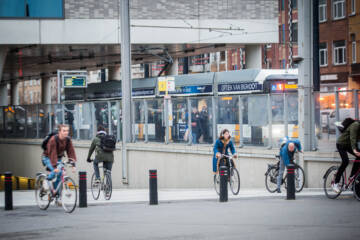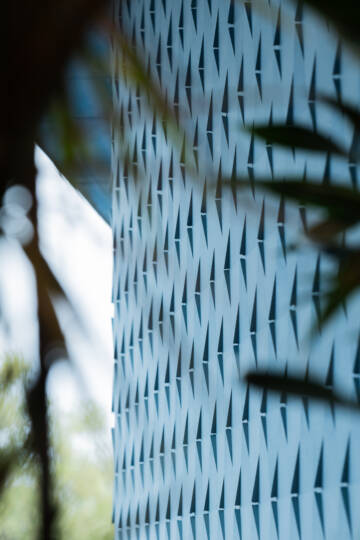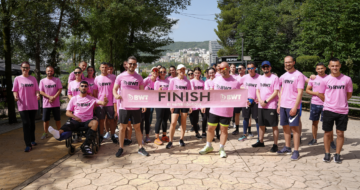In the field of sustainable technology we want to belong to the world top

The CAPTURE research center in the Zuidrand district of Ghent has officially opened the doors of a brand new building. Researchers from UGent, VUB and UAntwerpen will work there on circular economy and look for ways to reuse scarce raw materials such as water and plastics. "In the field of sustainable technology, we want to be among the world leaders," said UGent Rector Rik Van de Walle at the opening.
The CAPTURE research center in the Zuidrand district of Ghent has officially opened the doors of a brand new building. Researchers from UGent, VUB and UAntwerpen will work there on circular economy and look for ways to reuse scarce raw materials such as water and plastics. "In the field of sustainable technology, we want to be among the world leaders," said UGent Rector Rik Van de Walle at the opening.
The CAPTURE research center in the Zuidrand district of Ghent has officially opened the doors of a brand new building. Researchers from UGent, VUB and UAntwerpen will work there on circular economy and look for ways to reuse scarce raw materials such as water and plastics. "In the field of sustainable technology, we want to be among the world leaders," said UGent Rector Rik Van de Walle at the opening.
The new CAPTURE building will play a central role in research into the circular economy in Flanders. This research field is making strong progress, but also requires collaboration between many disciplines. But the step is necessary, believes Van de Walle, who has high expectations.
"We are explicitly putting forward themes such as sustainable development and sustainable technology development as priority policy choices," says Van de Walle. The rector will begin a second term in September. "We want to be among the best globally, to have a global impact to help make a difference globally."
The new building is described as a "melting pot" for linking research around resource reuse to ways of thinking out realistic applications. "With CAPTURE, we want to bring together both research groups and companies, so that together and on a scientific basis, they can develop and bring to market new technology for the recovery of raw materials."
CAPTURE works around the recovery of water, capture and conversion of CO2 and use of plastic waste. "Wastewater can be a source of pure water, for example," Van de Walle said. "CO2 can become a source of carbon for the production of chemicals. And plastic waste, as the increasingly diverse contents of our PMD bags attest, can serve as a raw material for new applications."
The Flemish government is already allocating 3.9 million euros for the building. Flemish Minister of Work Hilde Crevits (CD&V) therefore describes the opening of the building as "an important milestone in the Flemish policy on sustainability, innovation and circularity."
For funding, CAPTURE was able to call on 4.8 million euros from the European Regional Development Fund and 1.5 million euros from UGent. UGent's Incubation and Innovation Center is also contributing 2.2 million euros and the province of East Flanders another half million euros.
Latest insights & stories

ROAD SAFETY
Since 2018, the number of traffic casualties in Flanders has risen again. Currently, the figures are stagnating, but the risk of accidents with injuries remains high for vulnerable road users in Flanders. And that while traffic should be safe for all users and modes. We want to change this by focusing on transparent policy, training on safe behavior, infrastructure improvements, legislation and enforcement.

What is needed for a more circular construction sector? Insights from Sien Cornillie, Circularity expert at NAV
NAV, or "Netwerk Architecten Vlaanderen," is a professional organisation for architects in Flanders. It offers various services including professional development and advocacy for the architectural sector. NAV also fosters networking opportunities and provides advice on legal, technical, and management aspects. The network is currently working on a position paper on circularity. We sat down with Sien Cornillie, an expert on circularity and energy at NAV. This interview reflects her own opinion.

A Global Movement: The World Unites in a Pink Pledge for Clean and Sustainable Water
5,000 participants. 32 countries. €30,000 funds raised. And that's just the beginning.
Picture this: One step that sends ripples across the globe, transforming lives and creating waves of change. You might wonder, how can such a simple action for most of us have such a profound impact?